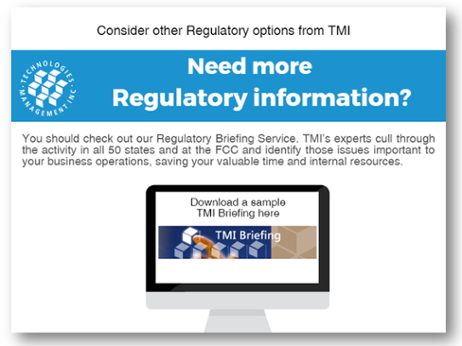 Today: Georgia Opts-In to FirstNet Plan, FCC November Open Meeting Developments
Today: Georgia Opts-In to FirstNet Plan, FCC November Open Meeting Developments
The Regulatory Mix will not be published 11/22/17 - 11/24/17 in observance of Thanksgiving
Georgia Opts-In to FirstNet Plan
Georgia Governor Nathan Deal has accepted the FirstNet plan to deliver a wireless broadband network to the state’s public safety community. Georgia becomes the seventh state to announce an “opt-in” decision after issuing a request for proposals (RFP) seeking bids from vendors willing to deploy and maintain an alternative RAN. Previously, the states of Michigan, Arizona, Alabama, Pennsylvania, Oklahoma, and North Carolina issued RFPs but later saw their governors announce “opt-in” decisions. "We are pleased Georgia is opting in to partner with FirstNet and AT&T to provide innovative communication technologies that will help us more effectively do our jobs,” said Georgia State Firefighters Association President Joey Hartley. “During emergencies, it is critical for us to have a fully functional network to communicate with one another and coordinate our response. There is no doubt FirstNet better equips us with the modern technology needed to save lives.”
FCC Delivers on an "Energetic November”
As promised by Chairman Pai, the FCC indeed had an energetic November, adopting all of the telecom related items with no major changes from the drafts issued prior to the meeting. See TMI Blog posted 11/2/17 “Checking In @ The FCC – The November Open Meeting.”
Accelerating Wireline Deployment: The FCC enacted various reforms intended to encourage providers to invest in next generation networks. Among other things, the item:
- Adopts a 180-day shot clock for resolution of pole attachment disputes;
- Allows LECs equal access to each other’s poles;
- Revises copper retirement rules to allow earlier notification of network changes and reduce the notice time from 180 days to 90 days;
- Eliminates the discontinuance requirements for solely wholesale services; and
- Expedites the approval of discontinuance applications in certain “grandfathered” situations.
See the News Release here.
Accelerating Wireless Broadband Deployment by Removing Barriers to Infrastructure Investment: The FCC eliminated the need for historic preservation review when a pole is replaced with a substantially identical pole. Some of the conditions the replacement pole must meet include that the original pole is not a historic property, that it does not cause new ground disturbance, and that it is consistent with various other size, location, and appearance restrictions detailed in the rule, including that it is located no more than 10 feet away from the original pole.
See the News Release here.
 Bridging the Digital Divide for Low-Income Consumers: The FCC took various actions to reform the federal Lifeline program including:
Bridging the Digital Divide for Low-Income Consumers: The FCC took various actions to reform the federal Lifeline program including:
- Limiting “enhanced” Tribal Lifeline support ($25 monthly in addition to the standard $9.25 per household) to facilities-based providers;
- Limiting enhanced Tribal support to rural areas and eliminating enhanced support in urban areas;
- Eliminating restrictions that barred Lifeline consumers from changing Lifeline providers for a year;
- Clarifying that Lifeline support is only available for mobile broadband at 3G or better levels, barring support for so-called “premium Wi- Fi” services that require use at a Wi-Fi hotspot.
A Notice of Proposed Rulemaking will address other issues, including:
- Limiting all Lifeline support to facilities-based providers;
- Allowing the states to certify broadband-only Lifeline providers instead of the FCC
- Adopting a self-enforcing budget for the program; and
- Requiring all Lifeline subscribers make some payment towards their service.
Advanced Methods to Target and Eliminate Unlawful Robocalls: The FCC adopted rules allowing phone companies to proactively block calls that are likely to be fraudulent because they come from certain types of phone numbers. This includes calls from: (1) phone numbers placed on a “do not originate” list by the number’s subscriber;(2) invalid numbers, like those with area codes that don’t exist; (3) numbers that have not been assigned to a provider; and (4) from numbers allocated to a provider but not currently in use.
See the News Release here
The FCC also proposed to eliminate altogether or streamline, the requirement that cable operators file Form 325, which collects information about cable system operations and to make available spectrum above 24 GHz, including 1,700 MHz of additional high-frequency spectrum for terrestrial 5G wireless use.
TMI Briefing Service subscribers, watch for upcoming detailed Briefings on a number of developments resulting from the FCC November Open Meeting.
____________________________
The Regulatory Mix, TMI’s daily blog of telecom related regulatory activities, is a snapshot of PUC, FCC, legislative, and occasionally court issues that our regulatory monitoring team uncovers each day. Depending on their significance, some items may be the subject of a TMI Briefing.




